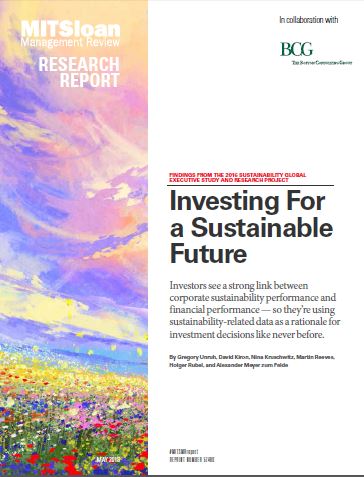Sustainability is alive and well – and pressing for change in corporate management
Written by Mark Sait
Posted on June 22, 2016
Reports of the demise of sustainability surface from time to time but a new MIT study clearly shows how crucial it is now to business futures.
The MIT report, Investing for a Sustainable Future, presents key findings that underline the centrality of sound, forward-thinking and effective corporate environmental, social and governance.
The report is a clear warning that corporate leaders who continue to ignore sustainability or only pay lip service to it are putting the future of their businesses at great risk.
Equally important, top management needs to strengthen their story about sustainability and enthusiastically promote what they are doing. Of course, for that, they need to be making changes that matter.
MIT Sloan Management Review says that mainstream investment decisions are increasingly being made on sustainability performance with a clear understanding that this is having and will continue to have a larger effect on financial success.
Demise of coal
More shareholders are making key “stay or leave” decisions based on how a company is responding to the challenges of sustainability, with the most visible current effect being on the coal industry.
The world’s largest coal group Peabody Energy has recently filed for Chapter 11 protection and investors have divested more than $2 trillion in assets from fossil fuel companies.
This starkly clarifies that every business leader needs to fully embrace sustainability and place it at the centre of operations. It can no longer be seen as a fluffy adjunct to long-term growth strategies.
While sustainability runs the gamut from energy and water saving to whole supply chain efficiency and ethical behaviour, every company can make substantial gains to both the bottom line and public perception with effective and easy steps.
These should include energy saving with better water management. LED lighting, smart controls, eco tap and showers, low-flush toilets and voltage optimisers are just a few of the highly effective ways to make a big impact.
The MIT study is based on a survey in collaboration with The Boston Consulting Group of more than 3,000 managers and investors in 100 countries.
Full value
The study underlines that many corporate managers still do not see the full value of good sustainability with only 60% in publicly traded companies believing that this has an effect on investor decisions.
That contrasts with 75% of senior executives in investment firms who say that sustainability performance is materially important when making “buy or leave” decisions.
Investors look closely at whether sustainability strategies in a company are improving both operational efficiency and revenues with 75% of them citing these as strong reasons to invest.
At the same time more than 60% say risks are reduced through that good sustainability performance reduces a company’s risks and strongly believe that it lowers a company’s cost of capital.
Almost half of investors will not back a business with poor sustainability performance while 60% of investment firm board members are willing to divest from companies with a poor sustainability footprint.
Communications gap
Poor communications are seen as an issue. Four in five board members of investment firms believe they invest responsibly but only 73% of middle managers and 62% of front-line employees say the same.
The need for better communications is further underlined by the fact that nearly 80% of corporate business board members and 85% of C-suite executives are fully informed about sustainability efforts but only 51% of senior managers and 31% of middle managers and front-line employees “are equally well informed”.
According to investors, sustainability arises in only 54% of the earnings calls and shareholder meetings they attend.
Indexes are going out of fashion, according to the survey with only 32% of managers in public companies saying their business is listed on a sustainability index. The reports advises:
“While more than 90% of these managers say their companies promote inclusion on these lists, only 44% say such honours are important. Investors are even more critical: Only 36% say that being included on a major index is an important factor in their investment decisions.”
Most tellingly, the study reveals that sustainability strategies are still quite thin on the ground. While nearly 90% of respondents say that a sustainability strategy is essential to remaining competitive, only 60% of corporations have one.
And while a clear business case is central to any strategy, only 25% of respondents say that their companies have developed one. Organisations that have made a sustainability-related business model change are twice as likely to report profit from sustainability than are companies that have not.
The changes are happening in the investment field with increasingly apparent effects on a range of businesses. All companies should take to heart the fact that 74% of investors believe that sustainability performance matters more than it did three years ago.
Investors do care more about sustainability than many corporate leaders accept and for those companies, the future seems more uncertain. It is crucial for the right vision and focus to be in place for the best business decisions to be made. Sustainability is one very important prism.
Read the full report: Investing for a Sustainable Future
